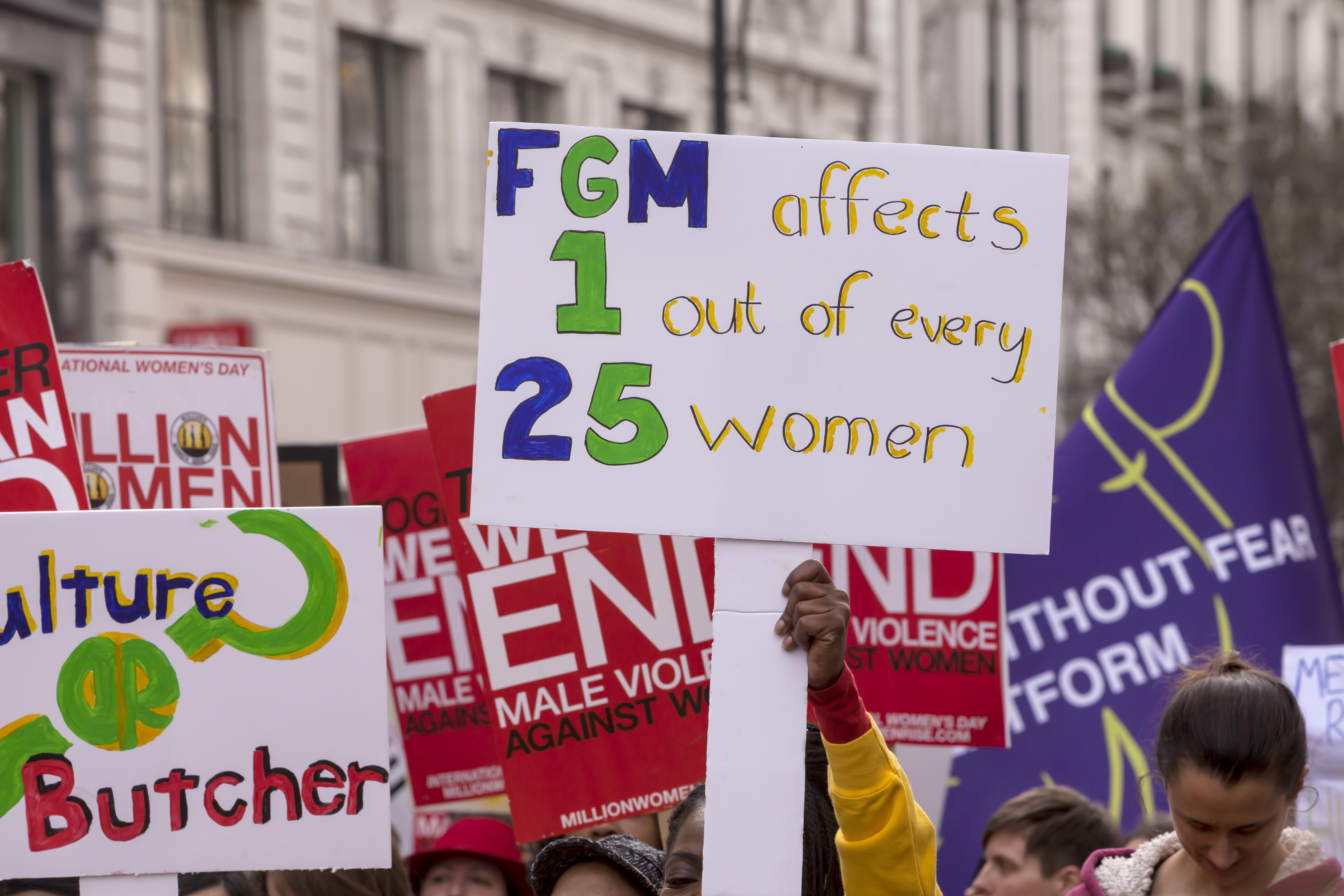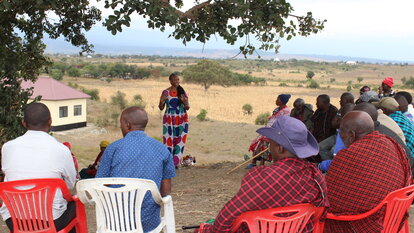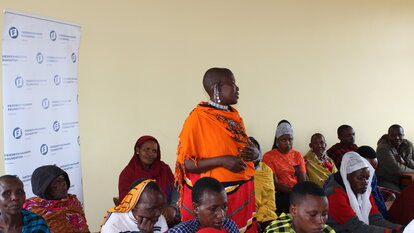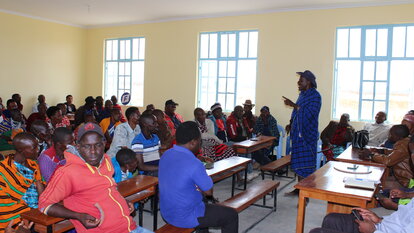Human Rights
Tanzanian Maasai voices in transformative bid to tackle early marriages and GBV

People march to protest the violence against women around the world.
© ShutterstockIn an unprecedented move, traditional female circumcisers have dumped their tools and joined hands with women and powerful male elders to end risky traditional practices. They now favour transformative socio-economic empowerment, a decision that is changing the face and fate of women and girls in their community.
In Tanzania’s Siha District, on the slopes of Mt Kilimanjaro, Africa’s tallest mountain, women and girls have had to contend with life-threatening and dream-shattering traditional rituals, styled as rites of passage. Nearly all women, especially young girls, are grabbed, their legs spread apart, and the circumcisers – often older women using crude knives and razor blades– cut off part of their genitals in a painful and cruel practice called female genital mutilation (FGM). Elders believe the practice boosts the value of a girl’s bride price, much like adding value to farm produce.
The communities in Donyomurwa and Karansi, the two wards in Siha District in Kilimanjaro region of north-western Tanzania, are not only fighting these dangerous rituals, but also have to endure severe drought which threatens their livelihood as cattle keepers. Their livestock – cattle, sheep and goats – die due to lack of pasture and water. To survive and replenish their stock, families often circumcise their daughters and marry them off early to collect more bride price, paid in livestock.
The female genital mutilation, prevalent among the Maasai community, also happens in the Arusha and Meru tribes. This practice involves cutting or removing parts of female genitalia for cultural reasons, not medical ones. The labia (folds of skin around the vagina) are cut and stitched together, and parts of the clitoris may be removed, leaving a small opening for urine and menstrual blood. Women who do not undergo this are often rejected by the community and seen as outcasts or of low value. For the clan elders, the laigwananis, female circumcision can occur at any age – even a two-week old baby girl is not off limits.
There are dozens of horrifying stories told in community empowerment meetings of the Kilimanjaro Women Information Exchange and Community Organization (KWIECO). The Friedrich Naumann Foundation for Freedom (FNF) has supported this local non-governmental organisation in its work championing justice, economic empowerment, human rights, and gender equality in Tanzania. The women and girls told their stories boldly during these meetings that sought to understand the Maasai tradition and to design a community-based approach against early marriages, teenage pregnancies and gender-based cruelty.
Take the case of Daima Laizer, the last-born daughter from a polygamous home with three wives and 19 children in Palestina Sanya village in Siha. She was already betrothed even before she began school aged eight years— much later than children in other parts of the world and Africa, who begin schooling at six years. Seeing her peers circumcised and forced into early marriages and denied the chance to education terrified her. Like many fathers in her community, Daima's father prioritised bride price over her right to education.
Her father did not take her to school. She sneaked her way to the halls of education, thanks to her juvenile fearlessness and a relentless teacher who spoke to her parents and made sure she went through school all the way to Form Four – the final class in high school. Even though she has no memory of when she was circumcised, she was too young; she still bears the scars.
Despite her father having already accepted a token of bride price from several possible suitors for her, Daima defied him and went to stay with her neighbour, who provided her with a safe home. She wants to be a teacher, like the woman who set her on the path to education.
Her journey from fear to empowerment has made her a role model, showing how determination and resilience can overcome adversity. With support from FNF and KWIECO over the past two years, Daima's story highlights the transformative power of education. In the Maasai community, voices like Daima's are rising, symbolising a strong movement against gender-based violence and driving lasting change.
Changed beliefs
Women like Esther Joseph, Sabina Laizer, Susana Lekoko, and Theresia Kaango are leading the fight against FGM and harmful practices. They are leading a group of 80 women, all former traditional circumcisers, known as engamuratani, who relied on female genital mutilation for their livelihoods – they were paid an amount equivalent to the value of a goat. Without another source of income, abandoning the practice was difficult.
"We practised female circumcision because it was part of our culture and an economic activity for us women. The FNF project changed our beliefs about FGM and our view of life, uplifting our economic status by showing us alternative livelihoods," says Susana Lekoko.
Women have blossomed into powerful voices for human rights, weaving threads of courage and determination into the fabric of change. Their journey is not just about numbers or statistics; it is about the profound transformation of lives and the uplifting of spirits.
With newfound confidence, these women have stepped into the forefront of advocacy, championing economic, social, and cultural rights with unwavering resolve. Their leadership has goes beyond words, manifesting in collaborative ventures, business acumen, and a shared commitment to gender equality and the protection of women and children
Supported by FNF, the project has trained and empowered over 120 women, establishing 24 community microfinance groups. These women, pooling their resources and engaging in internal lending, have accumulated TSh72,782,800 (€25,753.80). More than half of this amount is in voluntary savings. This financial backbone has lifted their families out of poverty and empowered them to stand tall against challenges, venturing into various businesses and acquiring assets like goats, chickens, and sheep.
"Thanks to revolving loans, I feel more empowered. I can borrow, invest, and use the profits to buy books, pens, and pay fees for my six children," says Evaline Peter. Alongside other women in the village, Evaline is actively involved in identifying and rescuing Endito or Alaiyen—uncircumcised young teenagers who are at risk of being forced into marriage.
This economic transformation goes beyond mere numbers. It has become a catalyst for change in their communities. These women have become advocates for human rights, especially in areas like economic, social, and cultural rights. Their voices, once subdued, now echo through the villages, demanding equality and justice for all.

FNF Tanzania project manager, Veni Swai addresses a community gathering at an FNF human rights awareness engagement meeting at a Maasai village in Tanzania.
© Friedrich Naumann Foundation
A Maasai community member speaking at an FNF human rights awareness workshop at a school Tanzanian.
© Friedrich Naumann Foundation for Freedom
A Maasai community member speaking at an FNF human rights awareness workshop at a school Tanzanian.
© Friedrich Naumann Foundation for FreedomImpact is palpable
The impact of this empowerment is palpable. Families are more secure, violence is on the decline, and poverty is becoming a thing of the past.
One such inspiring story comes from the Jamii Salama Women Group in Donyomurwa Ward. With strategic investments and visionary planning, they are not just farming; they are building a future. Their decision to invest TSh800,000 (€283) in acquiring a bull is not just about profits; it's about sustainability and growth. Their visionary approach anticipates selling the bull for an estimated value of TSh2,000,000 (€707.69). The foresight does not end there. Recognising the potential for growth, the group plans to reinvest a portion of the proceeds from the bull's sale into cultivating maize and beans on two acres of land. This strategic diversification will not only generate further revenue but also contribute to local agricultural development.
The story of these women is not just a success story; it is a beacon of hope for a more inclusive and equitable future. Through their courage, determination, and unwavering spirit, they are not just changing their lives; they are changing the world around them –step by step.
Young people are not being left behind. The project has engaged youths, numbering 150 strong, which has emerged as catalysts of change. Through FNF and KWIECO efforts, they reached out to a staggering 750 individuals, advocating for children’s rights, access to education, and family decision-making. Their message resonating well and sparking conversations on continuous education and male engagement within communities, which is paving the way for a more inclusive and informed society.
Beyond economic gains, these women, youth and male adults have become advocates for gender equality, addressing issues like sexual abuse, female genital mutilation (FGM), and barriers to education. Their dedication led to the education of 670 peers, creating a ripple effect of empowerment and awareness.
Local government leaders have continued to play a pivotal role in educating citizens on legal penalties for GBV; this is leading to a noticeable decrease in cases such as forced and early marriages. Success stories, like Munge village, stands out as tangible results, with reduced instances of sexual harassment—a testament to the power of community-driven initiatives.
Clan leaders, numbering 42, have engaged 1,272 individuals, advocating against harmful practices like FGM and sexual abuse while promoting gender equality and economic rights. Their collaboration with local government leaders continues to strengthen community-wide efforts, fostering a culture of inclusivity and accountability.
"We are working to sensitise communities in Donyomurwa ward about children's rights, especially those of girls, and discouraging parents from arranging early marriages for their daughters. We have rescued many underage girls from such marriages and are collaborating with authorities to gather evidence and verify the ages of those coerced into marriage," says Michael Lazarus Loitayo, a male advocate against FGM and early marriage.
Teachers, equipped with knowledge and resources, are making strides in creating safer school environments and reducing incidents of sexual violence. Their call for continued investment in pro-gender and human rights-based education underscores the crucial role of education in fostering societal change.
Law enforcement agencies, including the Police Gender Desk, Social Welfare, and Community Development Officers, have also stepped up their efforts and have acknowledged the project's effectiveness in preventive and responsive services. Emphasising community cooperation and the importance of bail as a right for all, they continue to underscore the guiding principles in child protection, ensuring a comprehensive approach to prevention and support gender based violence.
This empowerment is not just about personal success; it is about paving the way for a future where rights are upheld, voices are heard, and communities thrive. It is a testament to the resilience of the human spirit and the enduring power of unity in the face of adversity.
